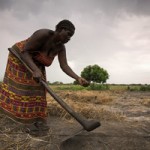

2013 Global Hunger Index – Greater Resilience-Building Needed
March 26, 2014

The 2013 Global Hunger Index, released for the 8th year by the International Food Policy Research Institute and partners, calls for greater resilience-building efforts to boost food and nutrition security. South Asia has the highest regional GHI score, followed by Africa south of the Sahara while Burundi, Eritrea and Comoros have the highest levels of hunger.
The media statement for the release of the index by IFPRI, Welthungerhilfe, and Concern Worldwide, notes that the developing world is becoming more vulnerable to a variety of shocks and stressors, from extreme weather events, climate change and environmental degradation to population pressures, macroeconomic crises, conflict, and poor governance.
The traditional approach to dealing with shocks is temporary infusions of aid, with separate development efforts focused on mitigating stresses and making people less vulnerable in the longer run. Yet the persistent vulnerability of regions—such as the Sahel and the Horn of Africa—suggests the traditional separation of relief and development efforts is not working.
The Index identifies hunger levels and hot spots across 120 developing countries and countries in transition. It scores countries based on three equally weighted indicators: (1) the proportion of people who are undernourished, (2) the proportion of children under five who are underweight, and (3) the mortality rate of children under five.
The 2013 Index indicates that global hunger is decreasing; the 2013 world GHI score has fallen by 34 percent from the 1990 GHI score. Yet world hunger still remains “serious,” with 19 countries suffering from levels of hunger that are either “alarming” or “extremely alarming.”
The 2013 Global Hunger Index calls for the silos between the relief and development communities to be broken down, and for a focus on approaches and outcomes that reflect an increased ability to resist, absorb, and transform in response to shocks.
“Adopting a resilience lens is challenging. We need to build consensus on what it means and on that basis adopt programs and policies that bridge the relief and development sectors,” said IFPRI research fellow Derek Headey.
Hear Australian Dr Derek Headey discuss the Global Hunger Index report.


